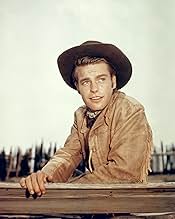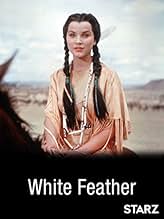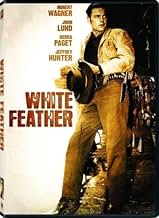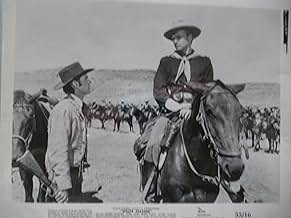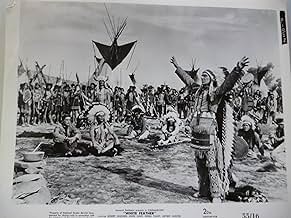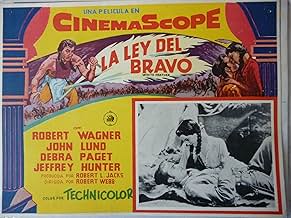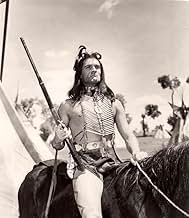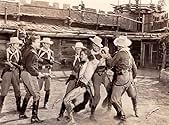Adicionar um enredo no seu idiomaIn 1877 Wyoming, during the peace negotiations between the Cheyenne and the USA, an Indian girl falls in love with a land surveyor, causing the ire of her Cheyenne fiance.In 1877 Wyoming, during the peace negotiations between the Cheyenne and the USA, an Indian girl falls in love with a land surveyor, causing the ire of her Cheyenne fiance.In 1877 Wyoming, during the peace negotiations between the Cheyenne and the USA, an Indian girl falls in love with a land surveyor, causing the ire of her Cheyenne fiance.
- Direção
- Roteiristas
- Artistas
- Lt. Ferguson
- (as Noah Beery)
- Indian Chief
- (não creditado)
- Direção
- Roteiristas
- Elenco e equipe completos
- Produção, bilheteria e muito mais no IMDbPro
Avaliações em destaque
This film seems to be the victim of poor editing. The Ann character played by Virginia Leith is potentially one of the most interesting in the film. There is more than a hint at the beginning that she has a dark secret. "Did my father tell you about me", she asks Josh Tanner (Wagner). Her father (played by Emile Meyer) later elaborates that "she is unfit merchandise". Unfortunately, this aspect of the plot is not developed. Jeffrey Hunter steals the show with his sympathetic and sensitive portrayal of Little Dog, a Cheyenne leader. He and Tanner become friends, and their friendship is one of the memorable elements in this film. Little Dog is proud to be a Cheyenne. He is torn between loyalty to his father, Chief Broken Hand (played by Eduard Franz), and his warrior code. In the end it becomes a choice between giving up his heritage to walk the White Man's road and dying well. The choice isn't as obvious as it seems. Little Dog's friend American Horse (played by Hugh O'Brian) has the opportunity to make the same choice and blows it.
This film's portrayal of the Native American tragedy is both sympathetic and different. Tanner tells the Colonel (played by John Lund) at the beginning that he has no feeling about Indians. He is indifferent. Ann makes her sympathies clear at the start. "I feel sorry for them," she says and she and Tanner watch the tribes as they prepare to sign a treaty giving up their lands. Ultimately, Tanner's friendship with Little Dog gives him a new perspective. Unlike "Devil's Doorway", another film which works hard to present the Native American view of the winning of the West, this film's ending is more upbeat. I still haven't been able to force myself to watch all of "Devil's Doorway".
Although marriages between Whites and Indians were not unusual in the real West, they had a difficult time surviving in the morality of films of the 40's and 50's. This film is one of the first in which a White character marries an Indian girl. Most Westerns of the time did not permit such relationships to become permanent. Paget's character in "Broken Arrow" is tragically killed. Similar violent endings terminate relationships in "Drum Beat", "Rock Island Line" and "Across the Wide Missouri". In "The Far Horizons" the Native American character ends the relationship by returning to her people so that one of the lead characters can marry a White woman. Dewey Martin's character in "The Big Sky" marries an Indian woman, but he has to make a choice. Will he return to the settlements where there is no place for her or will he live with the Blackfeet? Ultimately, he chooses Indian life. If the film's script had included part two of Guthrie's novel, we would see that this relationship was ultimately the victim of tragedy as well. Tanner's decision in this film to marry the Indian woman and live in the White world is truly unusual for films of the time.
It is the friendship between Tanner and Little Dog which makes the film worth watching. Wagner plays his relationship with Hunter's Little Dog with a lot more feeling and credibility than he does his romantic interest in Paget's character. Hunter's performance is a gem. Unlike Native American roles in so many other Westerns Hunter doesn't offer us the inane dialogue and dopey hand movements which we see too often in such roles. Although Tanner and Little Dog come from different worlds, their shared humanity is refreshingly realistic. It is ironic that their friendship becomes the catalyst for peace. Little Dog as a warrior is opposed to peace. "The treaty pen does not fit my hand", he jokes to Tanner.
Despite its flaws, this film is worth watching for its creative story and its sympathetic and credible portrayal of the Native American experience. The emphasis on story over action is unusual for such a Western and with a little better script it would have worked. Even so, it works well enough for me. I have watched it many times and will continue to do so.
The storyline may not be exactly fresh—some Indians wanting to make peace while others don't, plus the standard romantic interest—nonetheless, the individual stories are woven well into the larger conflict. Note too, how the screenplay (based on a true story) takes a generally sympathetic view of the Indians' plight— that is, being forced to move by treaty from their traditional lands. This was during a period when Hollywood was beginning to recognize Indians as human beings instead of convenient targets for repeating rifles.
Of course, an A-production requires a guaranteed box-office, and who better to bring in young folks than a leading heartthrob of the day, Robert Wagner. His rail thin frame may not look like John Wayne, but he still manages to convey the needed authority despite his pretty boy appearance. Also, Hunter remains physically impressive as the conflicted Little Dog.
I guess my only gripe is that everyone, Indians included, looks like they just stepped out of a fashion magazine. I mean the costumes are so squeaky clean and perfectly fit that you'd never guess this is supposed to be the dusty frontier. Anyway, this TCF release remains an underrated cowboy-Indian flick, especially for all its impressive crowd scenes.
(In passing—good touch allowing ambient noises such as barking dogs, squawking birds, and crying kids, to color the treaty signing scene. Usually, Hollywood would remove these as distractions, but here they lend a noisy realistic touch.)
One of the few 1950s Westerns to show sympathy towards the Indian plight, White Feather is a well intentioned and well executed movie. It suffers a little from familiarity with Broken Arrow (1950), where Delmer Daves had directed James Stewart and Debra Paget thru a similar script to the one that's now in front of Wagner and Paget; and lets face it-Wagner is no Jimmy Stewart- and Robert Webb is no Delmer Daves-but there's more than enough good here to lift it above many other liberal Westerns.
Away from the endearing and emotive story (and it is as the Cheyenne are forced out of Wyoming by the Federals), the film also boasts high points for the Western fan to gorge upon. It's gorgeously shot in CinemaScope by Ballard, a first class lens-man in the genre, and Friedhofer's score is pulsating, evocative and in tune with the tone of the tale. Also of note is that these Native Americans aren't caricatures or pantomime Indians. They may be being played by white actors (Hunter & Franz do especially good work), but they feel real and come out as the human beings they were. In fact the whole movie looks convincing.
There's some missteps along the way; such as Wagner over acting and having a voice that's sounds out of place in the Wild West, while the romantic angle (Paget is so beautiful here who could not fall in love with her?) does at times threaten to clog up the narrative. But these things don't hurt the film. On the flip side there's the smooth pacing of the piece, it's only when the tense and exciting climax has arrived that you realise how well the slow burn first half was handled. And Webb may well be a second unit director in all but name here, but his construction of the scenes with hundreds of extras is top notch work.
A fine and under seen Western that is based on actual events and doesn't over egg its pudding. 7/10
Você sabia?
- CuriosidadesFirst American movie filmed (in 1954) in Durango, Mexico, because art director Jack Martin Smith liked the soundstages in the city and found the surrounding landscapes to be just what he was looking for.
- Erros de gravaçãoThe Army, at no time during the Indian Wars, used Winchester repeating lever action rifles, as shown.
- Citações
Josh Tanner: Eveything you will see in this movie actually happened, with the exception being the Indians' language. For the purposes of this story, they will speak English so that you can understand them.
Principais escolhas
- How long is White Feather?Fornecido pela Alexa
Detalhes
- Data de lançamento
- País de origem
- Idioma
- Também conhecido como
- White Feather
- Locações de filme
- Fort Laramie National Historic Site - 965 Gray Rocks Road, Fort Laramie, Wyoming, EUA(actual Fort at center of events and activities portrayed)
- Empresa de produção
- Consulte mais créditos da empresa na IMDbPro
Bilheteria
- Orçamento
- US$ 1.125.000 (estimativa)
- Tempo de duração1 hora 42 minutos
- Proporção
- 2.55 : 1
Contribua para esta página


